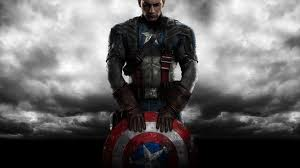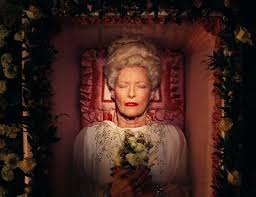Hey all, this week we’ll be looking at cinematographer Wally Pfister’s feature film Transcendence, starring Johnny Depp, Rebecca Hall, Kate Mara, and Morgan Freeman. It is rated PG-13 for sci-fi action, bloody images, strong language, and sensuality.
Transcendence follows Dr. Will Caster (Depp) and his wife Evelyn (Hall) as they create a machine that is all-knowing, while combining it with the full range of human emotions. His experiment, a very controversial one, makes him the target of many anti-technology terrorist groups. In their attempt stop Caster, they instead motivate him to become a participant in his own experiment. Will slowly develops an unhealthy desire for power and knowledge that makes it seemingly impossible to stop him.
4.5 out of 10
Reviews of this have been mostly negative, and I can understand why. We’ve all seen those extremely complex movies that are just too much for us to comprehend, and Transcendence was actually looking like it would avoid being one of those movies. The concept is so great in theory. If anything, it’s extremely original and let’s be honest, Hollywood has lacked in that area of recent. The originality, along with Johnny Depp’s capabilities led us to believe this was something real special. Not to mention it was directed by Wally Pfister, the main cinematographer for Christopher Nolan. Damn, this movie had so much potential. And I think that’s the reason the reviews were so negative; It just could have been so much better.
The cinematography was beautiful, and there was an abundance of fantastic visual sequences. There were some fantastic shots, no doubt the work of an experienced cinematographer. However, the struggle was with the purpose of these shots. Pfister kind of threw in random shots of plants and stuff just to show off his ability to work with a camera. It was visually stunning, but completely unnecessary. Didn’t really help with moving the film forward at all. It was all just for effect, and while that was really appealing, it was kind of just random and showboaty.
The screenplay was mediocre at best. The characters, like this movie, had so much potential. Depp’s character in particular had the opportunity to be so much more interesting that he actually was. Most of the time he was just there, not really doing or saying much that added to his character. There was so much more to explore with Caster. Depp did the best he could with such a poorly written character, so i guess that’s a positive. Morgan Freeman was just Morgan Freeman, as always. Rebecca Hall wasn’t bad either, her character wasn’t overly exciting as well. She was kind of just a pawn from beginning to end, and she really could have been so much more. I guess that seems to be the theme of this review.
I was really waiting for something super intense to happen, but it never happened. The whole movie was building action that just turned out to be bland. Nothing exciting or memorable ever happened that changed the mood or the direction of the film. It was all too gradual for the sci-fi thriller that it was supposed to be. Though it was supposed to be a thought provoking, mind enthralling thriller, it could have used a moment of intense action and extreme emotion, but there really wasn’t. It was all pretty lame to be honest. I guess that’s the whole reason the movie felt pretty boring to me.
This movie was no doubt supposed to make you think, and for a minute there, it did. I was honestly forced to think about what this movie had to say, but the only problem was, it didn’t last. I didn’t really feel enthusiastic about it enough to care for more than five minutes. The message was way too clear-cut. It was obvious what they were trying to do. They were obviously trying to question technology and its benefit, or lack thereof, on society. I’m pretty sure they asked it, in those exact words. Be more discrete!
This movie had so much potential which is why it is so disappointing. It fell short in so many categories. It was just so mediocre. Even the cinematography some how fell up short, in a way. The more and more I think about this movie, the more and more I realize how dumb it is. Poor Johnny Depp.
~Vig
5.5 out of 10
Science fiction is a hell of a genre.
In fact, it’s probably the strongest sub-category of drama one can hope for. The average sci-fi movie, with just the right amount of characters and a myriad of CGI (Maybe too much in some cases) could tell us a lot about our relationship with science in a very negative (See any time-travel movie) or positive (See…Matrix, maybe?) way. Most often, it lands neatly between with the perils and problems balanced by the endless possibilities.
Transcendence is an….interesting film about robotics and AI. We watch a scientist named Will slowly become accustomed to a new robot body but, you guessed it, things get sour when the limitations of artificial-intelligence are dramatically pushed to the edge by experimentation and so on and so on and so on.
In that respect, Transcendence’s story is pretty standard. Nothing bad, nothing good. It’s a typical sci-fi story if you boil it down. But part of me thinks that Transcendence lost a lot of interesting things in its leap from page to screen. Its the kind of premise that somebody like Isaac Asimov would have cradled but Hollywood suffocated to a point.
Start with the good stuff, shall we? Transcendence DOES have a lot of interesting things going on. It’s been done a good amount of times but plots where humans are somehow rebuilt as computers and how other humans related to those compersons are interesting. There are a lot of questions there: is that computer a person if they feel? Are those emotions genuine? Are our emotions genuine or are they the product of a bunch of patterns that can easily be repeated?
So Transcendence’s story has a lot of weight to it but does it have the right tools? Yes, yes it does. Poor Johnny Depp continually tries hard but never gets the right stage. And you never can go wrong with Morgan Freeman among others (Morgan Freeman has really embraced the Morgan Freeman Effect). The score, as many a IMDB reviewer has remarked, is moving.
Yet Transcendence has some squirming flaw that took me a while to name exactly: it’s a smorgasbord. A heap of filtered sci-fi tropes of the past couple of years. Aside from that, there’s trouble with whether its an encouraging piece for technology or not. I’m not asking for a straight answer but the film can’t quite balance the positives and negatives of science as much as it wants to (It alternates between showing the merits of AI Will’s plans along with its more sinister elements with noticeable unease). Meanwhile, the characters are…eh. There’s not too much to say. Most of them are cogs that gear the story further. A character in a sci-fi film could be more than a cog but, here, they’re just kind of going through the story.
http://www.youtube.com/watch?v=Otm4RusESNU. And that disappoints me. With some proper balance, more character development and execution this could have worked very well. But those holes are huge, gaping holes. Enough to make its solid grounding unsteady.
~Zach
IMDB: 6.3
Metacritic: 42
Rotten Tomatoes: 19%




